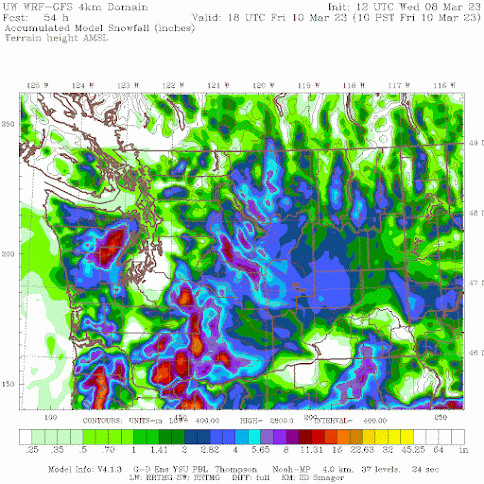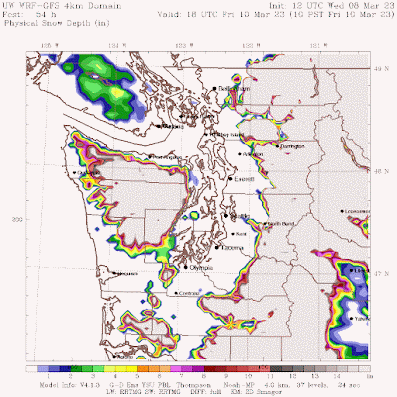My new podcast (see information below) not only talks about the current weather situation but answers a question many of you are asking:
Has Global Warming/Climate Change contributed to increased numbers and intensity of cold waves...and particularly cold waves over the western U.S.?
The answer is definitively no, something noted by statistics provided by the U.S. Environmental Protection Agency (EPA) and a number of peer-reviewed articles (see EPA graphic below).
And then there is the current chilly situation. Unbelievably, forecast models show two situations with the potential for light lowland snow (with little accumulation).
The accumulated SNOWFALL through 10 AM Thursday is shown below. Nothing major, but southwest Washington and northeast Oregon may get some flakes. Light snow over the eastern slopes of the WA Cascades.
To listen to my podcast, use the link below or access it through your favorite podcast service.









It'd be beneficial if you could elaborate on some of the historic theories of how melting ice in the arctic and antarctic creates an abundance of freshwater in the ocean and might influence prevailing currents in a way that can create cooler temperatures and how these theories didn't account for other climate change related issues with changing ocean currents that made these cooling theories less plausible.
ReplyDeleteAs in there's some fascinating changes happening with our planet's polar ice caps and the scientists studying it have lots of valuable information that would benefit the quality/informative nature of your narrative, like this Youtube video I watched last night: https://youtu.be/qo90uHHN6R8
On a more anecdotal level, I'm outside year round working in gardens and for near three decades I loved how it has always been a solid mid 40's in the PNW most of the year. And in the past three years, it's been much harder to motivate and get started because so much more often it seems to be in upper 30's and low 40's. That extra level of stress in my job has got me learning so much about the polar vortex and what's happening to the ice nursery days in the Beaufort gyre, which has changed dramatically.
As in, let's keep focused on what we're learning and researching with these changes rather than "is it climate change or not?" which lacks the nuance and depth of study we need to better understand our planet's weather patterns and how they're always changing.
I’m wondering if the relatively recent decreases in industrial output due to Covid 19 related slowdowns in co2 and other greenhouse gases and particulate emissions might have had any effect on the climate trends and may be partly to blame for the exceptional period of cold we’ve seen this year?
ReplyDeleteVirtually no effect on the trend of CO2 in the atmosphere. Little impact on the cold.
DeleteCliff, you have the patience of a saint. Thank.you for.your consistent use of data and the scientific method in the manner I learned in the 1980's.
DeleteThe steady upward trend of CO2 in the atmosphere since 1960 is well-documented (the "Keeling Curve"). The trend has shown no signs of abating in the last 3 years:
Deletehttps://gml.noaa.gov/ccgg/trends/
I could see this being a semi-common question, so I'll add a little more detail:
DeleteThe reduction in industrial output related to Covid-19 was relatively small, and still resulted in positive CO2 emissions, and atmospheric CO2 content continued to rise. 2019 global CO2 emissions were 37.08 billion tons, while for 2020 they 35.26 billion tons, a decrease of only 5%. Seasonally adjust atmospheric CO2 concentration as measured at the Mauna Loa observatory rose from 412 ppm to 415 ppm over the course of 2020, and is currently about 419 ppm.
Rather than causing a cooling trend, the expected effect is only a very slight slowdown in the rate of warming.
Far more significant than that single year emissions decrease of 1.8 billion tons is the fact that over the 15 years since CO2 emissions in North America and Europe peaked, they have declined by 2 billion tons per year. Unfortunately, emissions in the rest of the world are still increasing, but I think a shift has started that will eventually start to be seen in the emissions of the rest of the world, too, even as their quality of life improves.
Cliff, sorry if this is outside your wheelhouse, but I've been curious how solid paleoclimatology is these days. Back when I was in school there was still a lot of speculation about e.g. the causes of temperature swings in the Bølling–Allerød interstadial and the following few millennia.
ReplyDeleteThat history seems pretty relevant for estimating the risk of unexpected local or global climate shifts, but I rarely hear it discussed.
Significant wind event on now in the south sound. Trees down on at least 2 houses in federal way. No advisories on NOAA?
ReplyDeleteThis is something of a "late entry" to this thread, but YES the predictions (forecasts) have been pretty good, Professor! Here where the mountains begin (Glacier) there was snow all Friday morning, then afternoon rain. It's just after 1 am Saturday morning (3/11), and snow is falling steadily - big, half-inch clustered dendrites (clumps, thud-thud). "Winter" isn't quite over yet.
ReplyDelete[Caroline - Yup, he's a SAINT]